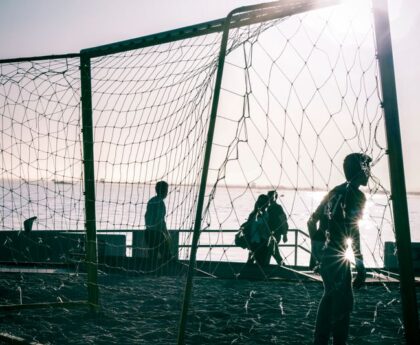Explosion causes woman to be thrown from personal watercraft in Florida Keys
Background
An explosion occurred on a personal watercraft in the Florida Keys, resulting in a woman being thrown off the vehicle. The incident highlights the potential dangers associated with recreational water activities and raises concerns about safety regulations and awareness.
The Incident
According to witnesses, the explosion happened suddenly and violently, causing the woman to lose control and be thrown off the personal watercraft. Local authorities responded promptly and the woman was rushed to a nearby hospital for medical treatment. The extent of her injuries is still unknown at this time.
Safety Regulations and Awareness
This incident emphasizes the importance of adhering to safety regulations and promoting awareness of potential risks associated with water activities. Personal watercraft, also known as jet skis, are popular recreational vehicles that offer a thrilling experience to riders. However, proper safety precautions must be taken to mitigate the risks involved.
Regulatory Measures
Government bodies and watercraft manufacturers should continue to work together to establish and enforce rigorous safety regulations for personal watercraft. This includes regular inspections, mandatory safety training courses, and ensuring the availability of safety equipment on all vehicles. By implementing comprehensive regulations, the authorities can help protect both riders and those around them.
Public Awareness and Education
Increasing public awareness about the potential dangers of personal watercraft and other recreational water activities is crucial. Education campaigns can be launched to inform individuals about the importance of wearing life jackets, using proper safety gear, and maintaining a safe distance from others while operating these vehicles. Additionally, providing information on the correct handling of fuel and maintenance practices can reduce the risk of accidents caused by mechanical failures.
Philosophical Discussion
Human Hubris and Risk
This incident raises deeper questions about the human tendency to underestimate risks and overestimate our control over the natural world. While we strive for excitement and adventure, it is essential to recognize our limitations and respect the power of nature. Engaging in activities like water sports necessitates a humble acknowledgment of the inherent risks involved and the need for safety precautions.
Individual Freedom vs. Collective Safety
The incident also presents a philosophical dilemma regarding the balance between an individual’s freedom to pursue recreational activities and the responsibility we have towards ensuring collective safety. Regulations and safety precautions are often seen as restrictions on personal liberty; however, they exist to protect not only the individual but also those sharing the environment with them. Striking the right balance between personal freedom and collective well-being requires a nuanced approach and ongoing dialogue.
Editorial
Strengthening Regulations and Education
It is imperative that authorities, watercraft manufacturers, and advocacy groups work together to improve safety standards and promote proper education. Governments should consider revising and strengthening existing regulations to ensure that personal watercraft operators are adequately prepared and equipped. Moreover, manufacturers can contribute by incorporating advanced safety features into their products.
Responsibility of Individuals
While regulations and education play a significant role in enhancing safety, it is ultimately the responsibility of individuals to prioritize their own safety and that of others. Personal watercraft riders must remain vigilant, follow safety guidelines, and be mindful of their impact on the environment and other water users. By acting responsibly, we can collectively reduce the risk of accidents and ensure enjoyable yet safe experiences.
Advice
For individuals planning to engage in personal watercraft activities or any recreational water sport, it is crucial to prioritize safety. Here are some key recommendations:
- Take a safety course: Enroll in a safety training course to learn the proper techniques and precautions for operating personal watercraft.
- Wear appropriate safety gear: Always wear a life jacket and any additional safety gear recommended for the specific water activity.
- Maintain your vehicle: Regularly inspect and maintain your personal watercraft to ensure it is in optimal working condition and minimize the risk of mechanical failures.
- Follow regulations: Familiarize yourself with local regulations for watercraft operation and comply with them at all times.
- Consider weather conditions: Check weather forecasts before heading out and avoid operating personal watercraft during adverse conditions.
- Practice situational awareness: Be mindful of your surroundings, other water users, and potential hazards to avoid accidents.
By respecting safety guidelines, we can enjoy water activities while minimizing the risks involved and contributing to the overall safety of ourselves and others.

<< photo by engin akyurt >>
The image is for illustrative purposes only and does not depict the actual situation.
You might want to read !
- Exploring the Meaning of Independence: Reflecting on July 4th in West Orange
- Injury Blow: Los Angeles Angels Place Star Player Mike Trout on IL with Hamate Bone Fracture
- Timberwolves and Anthony Edwards: A Max Extension Set to Usher in a New Era
- Breaking Barriers: California Company Receives FAA Certification for Revolutionary Aviation Technology
- The Future Takes Flight: Testing Begins for a Versatile Flying Car
- The Sparkling Spectacle: Chicago’s Unforgettable Fourth of July Festivities
- “USMNT vs. Mexico: The Battle for Concacaf Supremacy Unfolds in a Must-Watch Showdown”
- “The Ultimate Showdown: USMNT Takes on Mexico in the 2023 Concacaf Nations League – Where to Watch Live”
- Exploring the significance and celebrations of May 10 – Mexican Mother’s Day
- Mass Shooting in Philadelphia: Exploring the Tragic Impact of Gun Violence in America
- Will Jerami Grant’s Multi-Year Contract with the Blazers Propel Them to NBA Title Contention?
- The Future of the Trail Blazers: Jerami Grant’s Re-signing Signals Commitment and Ambition in Portland
- Unleashing the Elements: A Look into Pixar’s Toughest Production
- Morgan Wade: Blurring Genres and Making Waves in the Country Music Scene
- Morgan Wade: Unveiling the Rising Star in Country Music
- “Why the San Diego Padres Are Shaking Things Up: Exploring the Decision to Designate Nelson Cruz for Assignment”




